Hot!
Kenyans vote in droves in close-fought election race

Raila Odinga (left) and William Ruto are the frontrunners in the presidential race. By Simon MAINA (AFP/File)
Kenyans lined up before dawn to vote in a high-stakes election Tuesday, with the East African powerhouse on edge as two political heavyweights battle it out in a tight race for the presidency.
The country is hoping for a peaceful transition of power after almost a decade under President Uhuru Kenyatta, but concerns about vote-rigging linger after past election disputes spiralled into bloodshed.
More than 22 million people, about 40 percent of them under 35, are registered to vote in an election held against a backdrop of soaring inflation, a punishing drought and disenchantment with the political elite.
Deputy president and erstwhile heir-apparent William Ruto, 55, is running against Raila Odinga, the 77-year-old veteran opposition leader now backed by longtime rival Kenyatta after a stunning shift in allegiances.
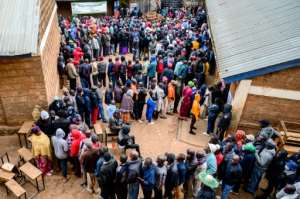
After a vitriolic campaign, voting was generally smooth.
But some incidents of delays in opening polling stations and problems with electronic voter registration equipment were reported.
And in one area in Nakuru county in western Kenya, police fired tear gas after youths blocked a road with burning tyres.
‘Hope my life will change’
Ruto was among the first to vote in his Rift Valley stronghold on what he described as “D-day”.
Odinga, who is known as “baba” or father and is making his fifth stab at the presidency, later cast his ballot in the Nairobi slum of Kibera.
In his bastion in the lakeside city of Kisumu, the atmosphere was festive, with motorcylists honking and blowing whistles.
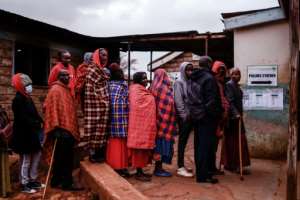
Clara Otieno Opiyo, a 35-year-old vegetable seller who travelled before dawn to vote with her five-year-old boy strapped to her back, said she hoped her vote would ease economic pain for working-class Kenyans like herself.
“I came here at 4am to vote, having a lot of hope and faith, but if my presidential candidate succeeds, my children’s schooling will be free, I will find work, and my life will change.”
Analysts have in recent days suggested that Odinga, a onetime political prisoner and former prime minister could edge past his younger rival.
If neither wins more than 50 percent, Kenya would have to hold a run-off for the first time in its history.
Tight security
Pressure is on the Independent Electoral and Boundaries Commission to ensure a free and fair vote in all six polls — for the presidency as well as for senators, governors, lawmakers, woman representatives and some 1,500 county officials.
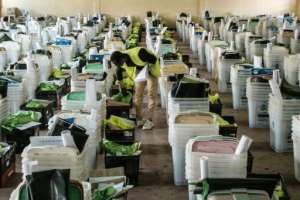
On Monday, six IEBC officials were arrested and the commission suspended several local polls because of erroneous ballot papers.
Kenya’s international partners are closely watching the vote in a country deemed a beacon of regional stability. Diplomats say they are cautiously optimistic.
Both Odinga and Ruto have urged a peaceful election, but fears remain that if the loser challenges the outcome — as widely expected — there could be unrest.
Security is tight, with more than 150,000 officers deployed across the country of about 50 million.
The trauma of the 2007 poll, which was followed by politically motivated ethnic clashes that killed more than 1,100 people, runs deep.
Odinga’s challenge to the 2017 election result that saw then foe Kenyatta re-elected was met with a heavy-handed police response that left dozens dead.
In a historic first, the Supreme Court annulled the 2017 vote, citing widespread irregularities.
No presidential election outcome has gone uncontested since 2002, and there will be an anxious wait for this year’s results which are not expected for several days.
As neither Ruto nor Odinga belong to the dominant Kikuyu tribe, which has produced three of the country’s four presidents, the election will open a new chapter in Kenya’s history.
‘New generation’
Ruto has painted the election as a battle between ordinary “hustlers” and “dynasties” — the Kenyatta and Odinga families that have dominated Kenyan politics since independence from Britain in 1963.
Some observers say economic pressure could vie with tribal allegiance as the big motivator for voters in a country where a third of the population lives in poverty.
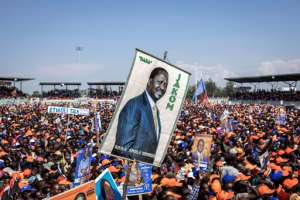
Lawyers David Mwaure and George Wajackoyah — an eccentric former spy who wants to legalise marijuana — are also standing for president but are likely to trail far behind the frontrunners.
If Odinga wins, his running mate Martha Karua would become deputy president, the first woman to hold the post.
The new president will face challenges to tackle the cost-of-living crisis, youth unemployment, a $70-billion debt mountain and entrenched corruption.
Already battered by the Covid pandemic which threw hundreds of thousands out of work, Kenyans are now suffering from the Ukraine war, which has sent prices of basic goods spiralling.
“Our country is now full of corruption, we want someone to deal with the issue permanently,” said first-time voter Ibrahim Ahmed Hussein, a 23-year-old student, in Kibera.
“I am voting so as to choose a leader who will change this country totally. Now we want to see a new change for the new generation.”
Hot!
Four ‘Pragya’ Operators fined GH¢ 2,400 for obstructing public road at Agbogbloshie

Four tricycle operators, popularly known as ‘Pragya’, have been prosecuted and fined GH¢600 each equivalent to 50 penalty units by the Accra Metropolitan Assembly (AMA) Sanitation Court for obstructing public roads at the Agbogbloshie Market.
The offenders, who were arrested by Public Health Officers of the AMA during a routine enforcement exercise, pleaded guilty to the offence and were subsequently convicted by the court.
The four operators were among the 21 offenders recently arrested at the Agbogbloshie Market for various sanitation and public order violations, including selling on open drains, obstructing walkways, and trading at unauthorised locations.
Speaking after the court proceedings, the Head of Public Health at the AMA, Madam Florence Kuukyi, said the court was lenient with the offenders since it was their first appearance, hence the fine, and warned that subsequent offenders would face stiffer penalties, including imprisonment.
Hot!
Police arrest suspect in Taxi driver murders in Accra
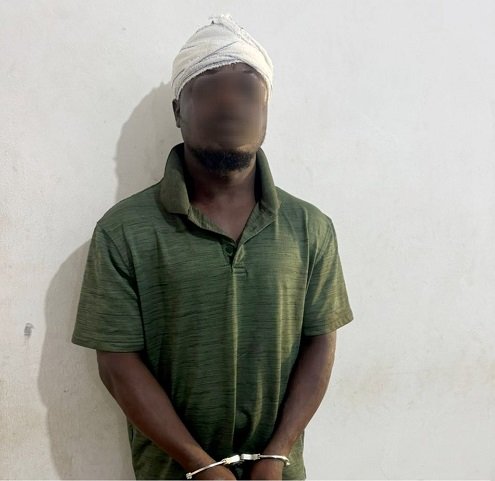
The Ghana Police Service has arrested a man believed to be behind a series of robberies and killings of taxi drivers in the Greater Accra Region.
According to a statement from the Criminal Investigation Department (CID), the suspect, Peter Akakpo, also known as “Dompe,” was arrested on October 13, 2025, at Kasoa-Domeabra.
Police say he is an ex-convict and is believed to have worked with another suspect, Vincent Gbetorglo, who was arrested earlier on June 30, 2025.
The arrests follow investigations into the deaths of two taxi drivers at Sakaman Blue Lagoon on May 9 and June 15, 2025. Police say the suspects contacted the victims before the attacks.
The Anti-Armed Robbery Unit of the CID led the investigation, using intelligence and surveillance to track down the suspects.
Police say efforts are being made to recover the vehicles of the murdered drivers.
The CID assured the public that investigations are still ongoing and promised to provide updates as new information emerges.
By: Jacob Aggrey

 Profile7 days ago
Profile7 days agoAlbert Litela Obidiaba: The artist who wove Ghana’s soul into the King’s Baton

 News7 days ago
News7 days agoDaddy Lumba’s wife, children run to court to injunct December 6 funeral arrangements

 News1 week ago
News1 week agoPresident Mahama to meet Auditor-General, Chief Justice and Attorney-General over misuse of public funds






